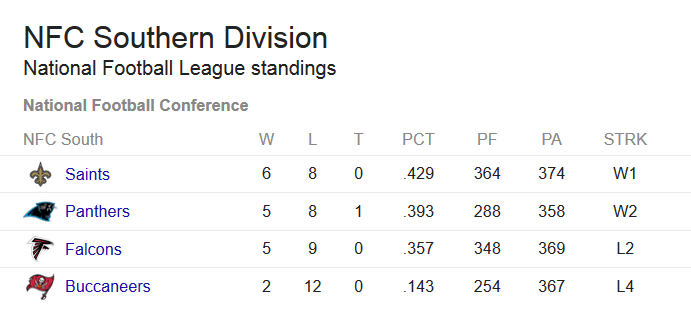NFL Division Champions Deserve Home Playoff Game Regardless of Record
Many times, we find ourselves eager to enhance or mend something that is better left untouched.
We’ve all heard the age-old saying: “If it’s not broken, don’t fix it.” I hail from Ohio, so I hope you’ll be lenient.
This reminds me of widespread dissatisfaction with the NFC South’s performance.
It might not be aesthetically pleasing, but that doesn’t necessarily mean it’s dysfunctional.
Following this weekend, where two out of the four NFC South teams emerged victorious, the Atlanta Falcons and Tampa Bay Buccaneers plummeted to 5-9 and 2-12, respectively.
Meanwhile, the Panthers advanced to 5-8-1, trailing the division-leading Saints at 6-8. Quite an eventful turn of events, isn’t it?

Welcome to the NFC South, where the winning percentage lingers around 30%.
Even the division winner might end up with a losing record. The NFC South’s comparative lack of success raises some critical questions:
Is it fair to grant home-field advantage to a division-winning team with a losing record?
Should a team at .500 be entitled to home-field advantage?
While many might argue “no,” recent history urges us to pause before hastily altering a current system prioritizing divisional competition over overall records.
The notion that a team shouldn’t be rewarded for clinching their division would undermine the essence and purpose of divisional play.
If one division winner isn’t accorded the same benefits as others (regardless of overall record), then what’s the rationale for having divisions at all?
Making division championships contingent on specific circumstances would create a quasi-divisional system, which was never the initial intention.
If one division winner isn’t a similar beneficiary to other division winners (regardless of overall record), then what’s the point of having divisions at all?
Another crucial factor to consider is that a significant shift in scheduling would be necessary if divisional play were disregarded.
The league still needs to determine which teams would be granted home-field advantage or face each other twice a year.
This would mark a seismic change in the NFL landscape, all in response to a ‘problematic’ scenario that has only arisen four times since 1970.
The notion that a team at .500 or below wouldn’t be competitive in postseason play isn’t borne out by history.
I was part of one such team in 2011. My Denver squad lost the final three games of the season, ending up at 8-8.
However, due to a tie-breaking scenario, we clinched the division after Oakland’s loss to San Diego at home.
This earned us a home game against the Wild Card Pittsburgh Steelers, who many believed would hand us our fourth consecutive loss.
That, however, wasn’t the case. Our offense executed explosive plays in both the running and passing game, while our defense maintained their stout performance, just as they had all year.
The game extended into overtime, but it didn’t last long as Tim Tebow connected with Demaryius Thomas for the sudden-death, game-winning touchdown.
Despite our 8-8 regular season record, we proved to be a more formidable playoff team than the Pittsburgh Steelers.
I witnessed firsthand the benefits and wisdom of rewarding divisional play.

However, we weren’t alone in this.
In 2010, the Seattle Seahawks concluded the season at 7-9 and secured the NFC West title.
More notably, they won their Wild Card playoff game, making them the sole team in NFL history to advance to the playoffs with a losing record—although this remains a possibility for this year’s eventual NFC South winner, depending on whether the New Orleans Saints can secure wins against Atlanta and Tampa.
Observing New Orleans return to their former formidable form with an impressive victory on the road in Chicago last night, the Saints appear to be a team that faced early struggles but could pose a threat in the playoffs later on.
This sentiment holds especially true with the prospect of a potential home game in the Superdome.
Despite the dome not offering much assistance this season (with four consecutive home losses), no one relishes traveling to New Orleans for their opening-round playoff match.

Other examples include the 1985 Cleveland Browns, who finished 8-8 and clinched their Division title but lost in the Wild Card game, and the 2008 San Diego Chargers, who won the AFC West with an 8-8 record but were defeated in the Divisional round after a Wild Card victory.
Considering this historical context, there seems to be little necessity for the NFL to alter how teams are rewarded for winning their divisions, regardless of their overall record.
The teams above displayed competitiveness and secured victories in three out of four instances.
The sole loss was a closely contested match where the Browns held a 21-3 lead at one point, only to succumb 24-21 as the Dolphins executed a remarkable comeback.
I believe none of the above instances offer compelling evidence for a change in the playoff format.
That would warrant a different discussion if we were rewarding underperforming football teams and squandering a playoff spot on an uncompetitive game.
However, when these teams continue to succeed in the playoffs—or at the very least, put up a competitive fight—substantial evidence suggests that the trials and tribulations endured throughout the year often fortify these teams.
Maintaining an NFL system that emphasizes divisional victories while allowing appropriate scheduling has proven effective.
There’s no need to tinker with something that works perfectly well.

